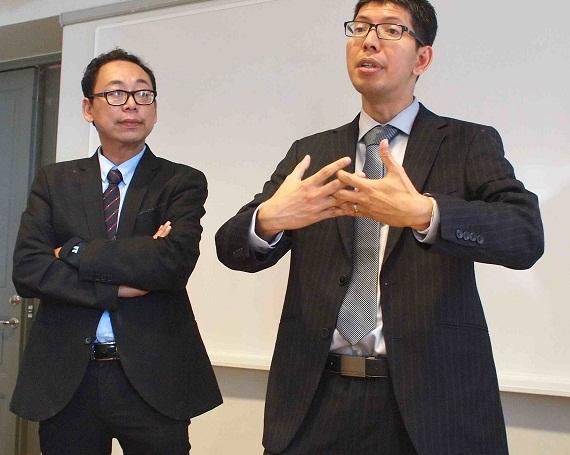HEADLINE
Rights Issues in Focus Ahead of Burma Elections
"As part of a European awareness-raising tour, two well-known Burmese activists arrived in Sweden this past week to discuss the historic vote. "
Ric Wasserman

Burma’s general elections on Nov 8th may either be a watershed, or more of the same. Much depends on how well Aung San Su Kyi’s National League for Democracy Party, or NLD, and several ethnic-based parties fare.
As part of a European awareness-raising tour, two well-known Burmese activists arrived in Sweden this past week to discuss the historic vote.
Each has a deep personal commitment to change after escaping from Burma over two decades ago.
Ric Wasserman has the story from Stockholm:
Min Zin and Aung Myo Min are standing before a whiteboard full of election statistics.
Min Zin, in self-exile from Burma since 1990 is a PhD student at Berkeley University in the United States.
He specializes in transition in civil-military relations. The military in Burma, he says, should feel worried as Aung San Su Kyi’s party, the NLD, gains momentum.
“After the 2012 by elections they got 46 seats. Less that 10 percent of the parliament, but it’s very symbolic,” he says, “It gave a clear message to the military. You guys are going to lose soon.”
One must remember Burma’s constitution guarantees that 25% of parliament seats go to the military.
It’s important the European Union member governments don’t simply view the upcoming elections as an end station for the reform process in Burma – rather the beginning. Work person to person, says Min Zin:
“Find reform-minded people within the regime and also to support and empower the opposition so you will see more negotiated transition,” he says, “That’s the best scenario. The international community should be instrumental to facilitate political contract, political agreement between the opposition and the military.”
He also stressed the importance of avoiding becoming too one-sided.
“If you have been seen to favor one side, either the opposition or the government that would not be productive,” he says, “The problem now is that the government and the military don’t find any incentive to pursue this path. So that’s where the international community could give more incentive or dis-incentive if they fail to pursue this path.”
While Min Zin has the objective of helping European countries better understand Burmese politics, his co-activist friend Aung Myo Min has a different agenda – to highlight human rights in Burma – especially for the LGBT community.
In another life the self-effacing Aung Myo Min might have been a standup comedian. His contact with the gathering at the Stockholm seminar was direct, at times comical.
Min fought alongside his student colleagues in the ABSDF, the All Burma Students Democratic Front in 1988.
But he couldn’t stay and fight with them. He was gay – unacceptable among his comrades. He went into exile in the U.S., remaining there for more than two decades.
“I was a student activist in 1988, that’s the reason I had to leave the country. I spent my time in the jungle in the military environment,” he says, “So it was very difficult for me to come out because the environment was so military, so structured, so difficult for me. But I have some friends who know my sexual orientation and support me a lot.”
His boyfriend, also in the military was later tortured to death. It left a deep emotional scar on Min, buthe turned his inner rage outward, to fight for human rights.
Today, Aung Myo Min is the founding director of the Human Rights Education Institute of Burma. He has been awarded seven international awards for human rights and research on human rights violations in Burma.
Aung Myo Min’s life and work was made into a documentary film called This Kind of Love, which Min recently showed in 22 US cities and will now tour Europe with.
“I’m now based in Yangon after 23 years in exile. Some people may say that, oh, this is a big improvement but I want to say that that there is a real situation on the ground that every day I’m dealing with,” he says.
Fighting for gay rights is dangerous in Burma. Aung Myo Min gets death threats and regular hate messages via sms. Buddhist monks tell him he should hope he will be reincarnated as heterosexual in his next life.
In spite of that he made the right choice, he says. There are so many prejudices and misconceptions in Burma he wants to address.
The issue of homosexuality is changing slowly, support from the international community has helped, says Min.
“The homosexual issue was a taboo and very sensitive and no media covered it before… because it was under the censorship,” he says, “But the country is a bit more open right now. There’s more coverage, more writing about homosexual people. That’s good.”
The upcoming election he says, can put focus on human rights issues and discrimination. It’s all about changing peoples attitudes.
“I have to prove that gay, we are like other human beings,” he says, “We are not a problem only, but we are part of the solution.”
- eng
- Ric Wasserman
- Burma Election
Komentar (0)
KBR percaya pembaca situs ini adalah orang-orang yang cerdas dan terpelajar. Karena itu mari kita gunakan kata-kata yang santun di dalam kolom komentar ini. Kalimat yang sopan, menjauhi prasangka SARA (suku, agama, ras dan antargolongan), pasti akan lebih didengar. Yuk, kita praktikkan!